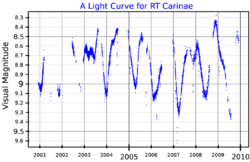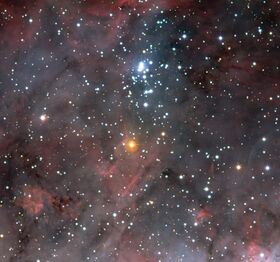Astronomy:RT Carinae
| Observation data Equinox J2000.0]] (ICRS) | |
|---|---|
| Constellation | Carina |
| Right ascension | 10h 44m 47.14715s[1] |
| Declination | −59° 24′ 48.1296″[1] |
| Apparent magnitude (V) | 8.36[2] (8.2 - 9.9[3]) |
| Characteristics | |
| Spectral type | M2+ Iab[4] |
| B−V color index | +2.31[2] |
| Variable type | LC[3] |
| Astrometry | |
| Radial velocity (Rv) | −20.91[5] km/s |
| Proper motion (μ) | RA: −7.221[6] mas/yr Dec.: 2.851[6] mas/yr |
| Parallax (π) | 0.3673 ± 0.0565[6] mas |
| Distance | 2,380+180 −150[7] pc |
| Absolute magnitude (MV) | −6.74[2] |
| Details | |
| Radius | 861[8] R☉ |
| Luminosity (bolometric) | 119,000[8] - 129,000[7] L☉ |
| Temperature | 3,660±170[8] K |
| Other designations | |
| Database references | |
| SIMBAD | data |
RT Carinae, also known as CD-58 3538, is a variable star in the Carina Nebula in the constellation Carina. It has a mean apparent magnitude of +8.55.
RT Carinae is a red supergiant with a spectral type of M2+ Iab and has a temperature of 3,660 K. With a diameter 861 times that of the Sun, it is one of the largest stars known. The luminosity is estimated to be 120,000 times more luminous than the Sun. It is close to the open cluster Trumpler 15, but is not thought to be a member.[9] It appears to be surrounded by a dusty nebula, possibly material ejected from the star itself.[10]

It is catalogued as an irregular variable star, but a number of possible pulsation periods have been detected. Analysis from observations over 40 years give variations with periods of 201 and 448 days, with other studies suggesting periods of 100 and 1,400 days.[12]
References
- ↑ 1.0 1.1 Van Leeuwen, F. (2007). "Validation of the new Hipparcos reduction". Astronomy and Astrophysics 474 (2): 653–664. doi:10.1051/0004-6361:20078357. Bibcode: 2007A&A...474..653V.
- ↑ 2.0 2.1 2.2 Cite error: Invalid
<ref>tag; no text was provided for refs namedlevesque - ↑ 3.0 3.1 Samus, N. N. et al. (2009). "VizieR Online Data Catalog: General Catalogue of Variable Stars (Samus+ 2007-2013)". VizieR On-line Data Catalog: B/GCVS. Originally Published in: 2009yCat....102025S 1. Bibcode: 2009yCat....102025S.
- ↑ Keenan, P.; McNeil, R. (October 1989). "The Perkins catalog of revised MK types for the cooler stars". Astrophysical Journal Supplement Series 71: 245–266. doi:10.1086/191373. Bibcode: 1989ApJS...71..245K.
- ↑ Mermilliod, J. C.; Mayor, M.; Udry, S. (2008). "Red giants in open clusters. XIV. Mean radial velocities for 1309 stars and 166 open clusters". Astronomy and Astrophysics 485 (1): 303–314. doi:10.1051/0004-6361:200809664. Bibcode: 2008A&A...485..303M.
- ↑ 6.0 6.1 6.2 Brown, A. G. A. (August 2018). "Gaia Data Release 2: Summary of the contents and survey properties". Astronomy & Astrophysics 616: A1. doi:10.1051/0004-6361/201833051. Bibcode: 2018A&A...616A...1G. Gaia DR2 record for this source at VizieR.
- ↑ 7.0 7.1 Davies, Ben; Beasor, Emma R. (March 2020). "The 'red supergiant problem': the upper luminosity boundary of Type II supernova progenitors" (in en). MNRAS 493 (1): 468–476. doi:10.1093/mnras/staa174. Bibcode: 2020MNRAS.493..468D.
- ↑ 8.0 8.1 8.2 Messineo, M.; Brown, A. G. A. (2019). "A Catalog of Known Galactic K-M Stars of Class I Candidate Red Supergiants in Gaia DR2". The Astronomical Journal 158 (1): 20. doi:10.3847/1538-3881/ab1cbd. Bibcode: 2019AJ....158...20M.
- ↑ Smith, Nathan (2006). "A census of the Carina Nebula - I. Cumulative energy input from massive stars". Monthly Notices of the Royal Astronomical Society 367 (2): 763–772. doi:10.1111/j.1365-2966.2006.10007.x. Bibcode: 2006MNRAS.367..763S.
- ↑ Forte, J. C.; Marraco, H. G. (1986). "RT Carinae; a late type supergiant within an elongated dusty nebula". Astrophysical Letters 25: 39. Bibcode: 1986ApL....25...39F.
- ↑ "ASAS All Star Catalogue". The All Sky Automated Survey. http://www.astrouw.edu.pl/asas/?page=aasc.
- ↑ Kiss, L. L.; Szabó, Gy. M.; Bedding, T. R. (2006). "Variability in red supergiant stars: Pulsations, long secondary periods and convection noise". Monthly Notices of the Royal Astronomical Society 372 (4): 1721–1734. doi:10.1111/j.1365-2966.2006.10973.x. Bibcode: 2006MNRAS.372.1721K.
 |


